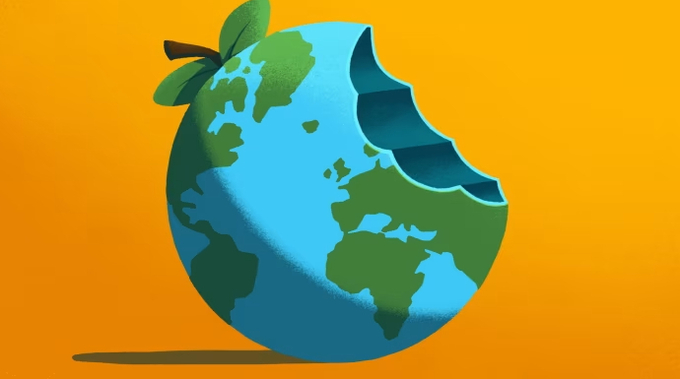December 20, 2025 | 17:39 GMT +7
December 20, 2025 | 17:39 GMT +7
Hotline: 0913.378.918
December 20, 2025 | 17:39 GMT +7
Hotline: 0913.378.918

© Andy Carter.
It is an easy statistic to reel off: 60mn under-fives around the world have stunted growth. It is harder to think about what it really means.
More often than not, it means a child does not have enough to eat, or their intake lacks the nutrients for full development. Though we tend to associate stunted growth with shortened height, it means more than a few irreversibly lost inches. Early undernutrition and malnutrition can go on to permanently sour adulthood, by lowering cognition and wages, and raising susceptibility to chronic diseases.
Childhood malnutrition is one target of an open letter published last week that calls for urgent action on food insecurity.
The letter, co-ordinated by the World Food Prize Foundation and backed by globally renowned scientists, argues that, without a moonshot in agricultural research, we are heading for a crisis in 2050. “Reversing our current trajectory towards a tragic mismatch of global food supply and demand by mid-century requires definitive action now,” it urges.
The letter pushes for a new green revolution, harnessing breakthroughs in biology and genetics, as well as artificial intelligence, to scale up food production. With an estimated 700mn going hungry today, and around 1.5bn more mouths to feed by 2050, it is a timely intervention.
The good news is that solving hunger seems scientifically tractable, given the inventive research happening across the globe. The less palatable news is that it is unlikely to be a gentle stroll in a wheat field. It will involve nourishing public acceptance of an altered food landscape, dotted with controversial technologies like genetically modified or edited crops and lab-grown microbes for meals.
Another hurdle is fixing market failures, where commercial objectives do not align with social need. Securing investment in small-scale indigenous crops, for example, is tricky given the nature of one-crop-feeds-all modern agribusiness. As a result, to borrow the title of Raj Patel’s 2007 book about the world’s food systems, we are both stuffed and starved, with obesity and malnutrition rising in tandem.
Even as Africa’s population climbs, maize yields are projected to decline throughout the continent, where it is the major staple. Climate change and extreme weather threaten output, the letter says, and “additional factors such as soil erosion and land degradation, biodiversity loss, water shortages, conflict, and policies that restrict innovation, will drag crop productivity down even further”.
It advocates for several “moonshot” initiatives: enhancing photosynthesis in wheat and rice; developing cereals that can be grown without fertiliser; increasing the shelf life of fruit and vegetables; nurturing overlooked crops, including indigenous varieties; and creating novel foods from microorganisms and fungi.
The majority of the signatories are Nobel laureates: they include economist Joseph Stiglitz, co-inventor of Crispr gene-editing Jennifer Doudna, Nigerian writer Wole Soyinka and the Dalai Lama. Others are recipients of the World Food Prize, an annual award now worth $500,000 set up by American scientist Norman Borlaug, whose wheat research propelled Mexico to self-sufficiency in the 1950s.
The letter was instigated by Cary Fowler, who won in 2024 for work on a global seed vault. When the letter was published, signatory Richard J Roberts, the 1993 medicine laureate, reprised his criticism of organisations opposed to GMOs like Golden Rice.
That stance, Roberts stated last week, had potentially cost the lives of millions of children: “In the last 30 years, there has not been a single credible report of any problem . . . despite the fact that literally millions of tons of GM crops have been grown and eaten around the world both by humans and animals.”
GMOs are not the only game in town. The Bezos Centre for Sustainable Protein at Imperial College London is exploring microbial foods, which are produced by microorganisms such as yeast through fermentation.
Microbial foods can be cultivated quickly and sustainably, without the need for much land or water. Another project, funded by the US government, helps women smallholder farmers in some African countries to grow hardier versions of local crops such as soursop and okra. Improved harvests have helped some to pay their children’s school fees.
It is not hopelessly idealistic for science to toil towards the end of hunger. Such research may even deliver a geopolitical pay-off. As John Boyd Orr, a pioneering Scottish doctor and nutritionist who became the first head of the UN’s Food and Agriculture Organization, once observed: “World peace must be based on world plenty.”
(Fincial Times)

(VAN) The global population is expected to grow in the coming years. This means higher demand for animal protein, and therefore, challenges and opportunities for the animal nutrition industry.

(VAN) $58.8 million from Global Environmental Facility targets efforts in Bangladesh, DR Congo, India, Mexico, Senegal, Tanzania and Ukraine.

(VAN) Chinese industry groups are urging a suspension of phosphate fertilizer exports, a move that may tighten global supply and push up prices just as U.S. farmers prepare for spring planting.

(VAN) OMB Director Russell Vought said the National Science Foundation "will be breaking up" the National Center for Atmospheric Research in Colorado.

(VAN) Budget-friendly drive-through and convenience store coffee locations are seeing strong, sometimes double-digit, growth in visits.

(VAN) 2025 AQUASTAT Water Data indicates that pressure on freshwater resources is growing as demand increases in regions of scarcity.

(VAN) Planet-warming pollution rates exploded after the end of World War II. James Watt’s steam engine launched the Industrial Revolution in 1769.